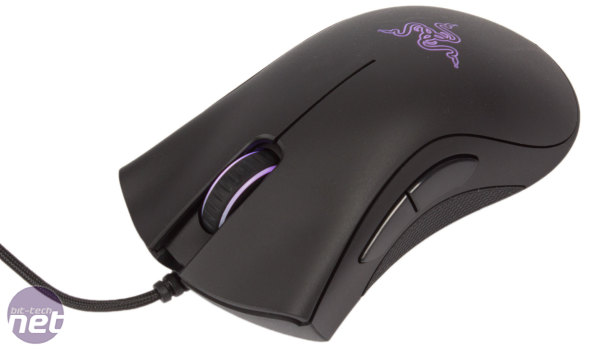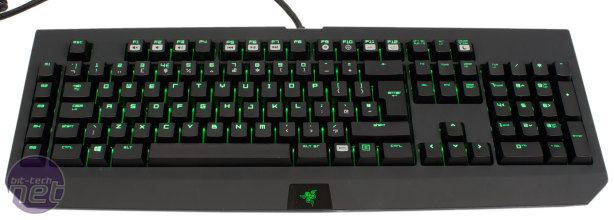
bit-tech: What are you looking to gain from your presence at E3?
Min-Liang Tan: Hang out with more gamers there, meet more of the fans and talk to them. At a lot of the events that we do, it's not branding or marketing. Our userbase knows us and we're happy with that. Are we looking to expand that? Not necessarily. One of the questions many people ask me is if we are ever going to go mainstream. Our answer is we're not going go mainstream, mainstream is going to come to us because we're going to see more gamers everywhere. At E3, we want to present our new products, we want to get in touch with our community and our fans.
bit-tech: How do you use partnerships with other companies like games developers or even other hardware manufacturers to your advantage at tradeshows like E3 and Gamescom?
Min-Liang Tan: Well, we work with them. We're huge fans of the games we work with. Especially in the UK, for example, we've got partnerships with a lot of game developers and we loan them products, we showcase their games. We think of this as a symbiotic kind of relationship that is great for the entire industry. Today we've got a massive software platform with Cortex that we like to showcase games from indies on, for example, and we hope to continue to be able doing that.
bit-tech: You were recently placed third on the Juniper Research list of most globally influential executives in technology space – in what way do you see yourself influencing the world of technology?
Min-Liang Tan: I think the big deal about that is it's a great recognition for gamers. I don't see it for myself. I think it's more that the world is waking up to the fact that gaming or gamers are really pushing the envelope of technology. Let's look at processing power – who needs the most amount of processing power right now? Gamers. They're the ones pushing GPU technology, streaming and VR, for example. We are the ones that are pushing things like gesture technology; the Nintendo Wii did a great job there. It's more a recognition that everyone's waking up to that: who are these gamers? Why is technology so important to them, and more importantly, why are they so important for technology? That's what I think that whole positioning is about. It's a great recognition for gamers as a whole and the work that Razer does for gamers.
bit-tech: It's been said that with great power comes great responsibility. Are you trying to use your influence to better the world of technology and gaming, and if so, how?
Min-Liang Tan: I think it's a responsibility. A duty. Especially since Razer has morphed. I think of the early days where it used to be that we had to put the Razer wording logo on products. Then, many years ago, it kind of morphed to the fact that all we needed to do was put a triple-headed snake logo. Today, we've reached the point where if any gamer just sees the black and acid green accent, without even seeing the logo, he's going to know it's Razer. It's pretty insane to be able to reach this point and I think we have a leadership role in innovation and technology for gamers and we see it as a responsibility, to be very candid. Razer's a great platform to try new products and new technologies and we tend to harness that and really propagate things.
Conversely, and what's more important, is why do we things like BBC and CNBC etc. We are evangelising what we as gamers represent to the world to a certain extent. I've spent a lot of my time in the past with people telling me I'm wasting my time with gaming. Everything I've been told about wasting my time has become the most valuable asset to me. And that's something that we want to do, to essentially evangelise gaming as a sub-culture, and one that we should be proud of.
bit-tech: What changes would you like to see in the world of gaming and how can Razer and other hardware companies go about implementing them?
Min-Liang Tan: I kind of like the way that it's growing but I think I'd like to see more power for the community as a whole, I think that's very important. That's one reason why we reach out to the community all the time. That's what we did OSVR [Open Source Virtual Reality] for. We put the entire IP, both hardware and software designs, right into the open source so the community could get involved with it. So that's one thing I'd love to see more of. More community engagement, more community leadership.
Min-Liang Tan: Hang out with more gamers there, meet more of the fans and talk to them. At a lot of the events that we do, it's not branding or marketing. Our userbase knows us and we're happy with that. Are we looking to expand that? Not necessarily. One of the questions many people ask me is if we are ever going to go mainstream. Our answer is we're not going go mainstream, mainstream is going to come to us because we're going to see more gamers everywhere. At E3, we want to present our new products, we want to get in touch with our community and our fans.
bit-tech: How do you use partnerships with other companies like games developers or even other hardware manufacturers to your advantage at tradeshows like E3 and Gamescom?
Min-Liang Tan: Well, we work with them. We're huge fans of the games we work with. Especially in the UK, for example, we've got partnerships with a lot of game developers and we loan them products, we showcase their games. We think of this as a symbiotic kind of relationship that is great for the entire industry. Today we've got a massive software platform with Cortex that we like to showcase games from indies on, for example, and we hope to continue to be able doing that.
bit-tech: You were recently placed third on the Juniper Research list of most globally influential executives in technology space – in what way do you see yourself influencing the world of technology?
Min-Liang Tan: I think the big deal about that is it's a great recognition for gamers. I don't see it for myself. I think it's more that the world is waking up to the fact that gaming or gamers are really pushing the envelope of technology. Let's look at processing power – who needs the most amount of processing power right now? Gamers. They're the ones pushing GPU technology, streaming and VR, for example. We are the ones that are pushing things like gesture technology; the Nintendo Wii did a great job there. It's more a recognition that everyone's waking up to that: who are these gamers? Why is technology so important to them, and more importantly, why are they so important for technology? That's what I think that whole positioning is about. It's a great recognition for gamers as a whole and the work that Razer does for gamers.
bit-tech: It's been said that with great power comes great responsibility. Are you trying to use your influence to better the world of technology and gaming, and if so, how?
Min-Liang Tan: I think it's a responsibility. A duty. Especially since Razer has morphed. I think of the early days where it used to be that we had to put the Razer wording logo on products. Then, many years ago, it kind of morphed to the fact that all we needed to do was put a triple-headed snake logo. Today, we've reached the point where if any gamer just sees the black and acid green accent, without even seeing the logo, he's going to know it's Razer. It's pretty insane to be able to reach this point and I think we have a leadership role in innovation and technology for gamers and we see it as a responsibility, to be very candid. Razer's a great platform to try new products and new technologies and we tend to harness that and really propagate things.
Conversely, and what's more important, is why do we things like BBC and CNBC etc. We are evangelising what we as gamers represent to the world to a certain extent. I've spent a lot of my time in the past with people telling me I'm wasting my time with gaming. Everything I've been told about wasting my time has become the most valuable asset to me. And that's something that we want to do, to essentially evangelise gaming as a sub-culture, and one that we should be proud of.
bit-tech: What changes would you like to see in the world of gaming and how can Razer and other hardware companies go about implementing them?
Min-Liang Tan: I kind of like the way that it's growing but I think I'd like to see more power for the community as a whole, I think that's very important. That's one reason why we reach out to the community all the time. That's what we did OSVR [Open Source Virtual Reality] for. We put the entire IP, both hardware and software designs, right into the open source so the community could get involved with it. So that's one thing I'd love to see more of. More community engagement, more community leadership.

MSI MPG Velox 100R Chassis Review
October 14 2021 | 15:04










Want to comment? Please log in.